Institute for Research on Innovation and Services for Development
Resilience - Innovation - Sustainable Development | Transparency – Organization – Meritocracy
Seminari di formazione per il Terzo Settore su Business e Diritti Umani – Firenze, 9 Aprile 2019
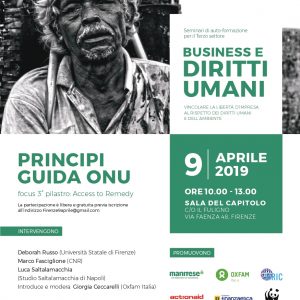
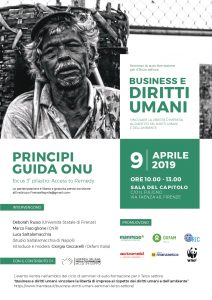 Il 9 aprile 2019 presso Centro Servizi e Formazione (Il Fuligno) in Firenze si terrà il quarto “Seminario di formazione per il Terzo Settore su Business e Diritti Umani“.
Il 9 aprile 2019 presso Centro Servizi e Formazione (Il Fuligno) in Firenze si terrà il quarto “Seminario di formazione per il Terzo Settore su Business e Diritti Umani“.
L’evento rientra nel più ampio progetto “New Business 4 Good” finanziato dall’Agenzia Italiana per la Cooperazione allo Sviluppo, Mani Tese, in collaborazione con Oxfam, Fondazione Finanza Etica, Action Aid, HRIC e WWF, che prevede la realizzazione di un ciclo di 6 seminari di “knowledge & capacity building” per associazioni e ONG, finalizzato a rafforzare le capacità del Terzo Settore di promuovere un cambio di paradigma produttivo e di attivarsi in favore delle comunità impattate dall’attività di impresa.
L’obiettivo del seminario di Firenze è riflettere in modo particolare sulle questioni attinenti all’accesso ai rimedi di cui al terzo Pilastro dei Principi Guida ONU su imprese e diritti umani.
Al seminario parteciperà il dott. Marco Fasciglione, ricercatore del CNR IRISS, con un intervento che illustrerà alcuni aspetti problematici riguardanti l’accesso ai rimedi per le vittime di violazioni dei diritti umani compiute nell’ambito delle attività di impresa.
In particolare, tra le principali tematiche saranno esaminate:
- il coordinamento tra i diversi centri di responsabilità (enti privati verso istituzioni statali);
- l’abbattimento delle barriere all’accesso ai rimedi in situazioni di violazioni extraterritoriali.
Resources
- Per ulteriori informazioni è possibile contattare il Responsabile delle attività del CNR IRISS per il progetto CO.RE. Corporate Human Rights and Environmental Due Diligence e la Promozione della Corporate Responsibility, dott. Marco Fasciglione – Ph: +39 081 2470991 – Email: m.fasciglione@iriss.cnr.it
April 2nd, 2019
Assegno IRISS n° 3/2019
PUBBLICA SELEZIONE PER IL CONFERIMENTO DI N° 1 ASSEGNO “PROFESSIONALIZZANTE” PER LO SVOLGIMENTO DI ATTIVITÀ DI RICERCA NELL’AMBITO DEL PROGETTO “A SMART TOURISM PLATFORM (STOP)” – FINANZIATO DALLA REGIONE CAMPANIA NELL’AMBITO DEL PROGRAMMA OPERATIVO FESR CAMPANIA 2014-2020 – ASSE PRIORITARIO 1 “RICERCA E INNOVAZIONE” – OBIETTIVO SPECIFICO 1.1 – INCREMENTO DELL’ATTIVITÀ DI INNOVAZIONE DELLE IMPRESE” – (CUP B23D18000080007)
Scadenza: 19/04/2019
April 2nd, 2019
Port Baby Walking Tour “Passeggiata alla Base della Marina Militare e al Molo San Vincenzo” – Napoli, 2 Aprile 2019

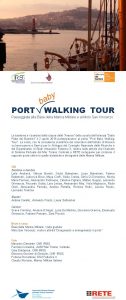 Il 2 aprile 2019, si svolgerà il primo “Port Baby Walking Tour” alla Base della Marina Militare e al Molo San Vincenzo.
Il 2 aprile 2019, si svolgerà il primo “Port Baby Walking Tour” alla Base della Marina Militare e al Molo San Vincenzo.
La visita, con la consulenza scientifica dei ricercatori del CNR IRISS (Istituto di Ricerca su Innovazione e Servizi per lo Sviluppo) e del Dipartimento di Studi Umanistici Federico II, rientra nelle attività che l’Autorità di Sistema Portuale del Mar Tirreno Centrale e RETE (Associazione Internazionale per la Collaborazione tra Porti e Città) sviluppano attraverso il “Nodo avanzato di RETE” per costruire il rapporto porto-città e in quelle didattiche e divulgative della Marina Militare.
Alla passeggiata parteciperanno le bambine e i bambini (accompagnati da docenti e alcuni genitori) della classe delle “Arance” della scuola dell’infanzia “Dalla Parte dei Bambini”.
L’iniziativa, si inserisce nelle attività del tavolo operativo “Porto-Comunità” del “Nodo avanzato di RETE” coordinato dal CNR IRISS e prosegue il percorso iniziato nel 2015, dal gruppo di ricerca con il Community Psychology Lab Federico II, di restituire il Molo San Vincenzo alla città sia nella sua funzione portuale, sia come spazio pubblico aperto alla comunità urbana, favorendo il dialogo e la collaborazione tra le Istituzioni coinvolte.
Il public engagement della terza missione del CNR si concretizza in questo progetto di ricerca-azione svolto da Massimo Clemente, Gaia Daldanise e Eleonora Giovene di Girasole del CNR IRISS.
Resources
April 1st, 2019
Seminario «La coopération sociale: un instrument de croissance en zones défavorisées» – Strasbourg, 2 aprile 2019
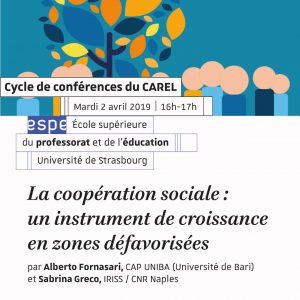
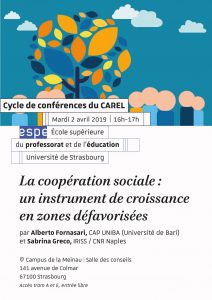 Il 2 Aprile 2019, presso l’École supérieure du professorat et de l’éducation (ESPE) de l’Université de Strasbourg, si terrà il seminario “La coopération sociale: un instrument de croissance en zones défavorisées” organizzato nell’ambito del «Cycle de conférences du Centre d’Apprentissage et de Ressources pour une Éducation aux Langues (CAREL)».
Il 2 Aprile 2019, presso l’École supérieure du professorat et de l’éducation (ESPE) de l’Université de Strasbourg, si terrà il seminario “La coopération sociale: un instrument de croissance en zones défavorisées” organizzato nell’ambito del «Cycle de conférences du Centre d’Apprentissage et de Ressources pour une Éducation aux Langues (CAREL)».
Al seminario parteciperà la dott.ssa Sabrina Greco, ricercatrice del CNR IRISS, con un intervento su «Le projet pilote Innovation dans la société: parcours formatifs et valorisation du capital humain au Soudan (INSO). Une action pour affronter les causes profondes de la migration».
In particolare, illustrerà il contesto migratorio sudanese ed analizzerà le strategie del progetto INSO, in termini di azioni pratiche messe in atto per limitare i flussi migratori diretti verso i paesi del Bacino mediterraneo.
Resources
March 30th, 2019
Assegno IRISS n° 2/2019
PUBBLICA SELEZIONE PER IL CONFERIMENTO DI N° 1 ASSEGNO “PROFESSIONALIZZANTE” PER LO SVOLGIMENTO DI ATTIVITÀ DI RICERCA NELL’AMBITO DEL PROGRAMMA DI RICERCA “INTEGRATED TECHNOLOGY SYSTEM FOR ACCESSING IN-VISIBLE HERITAGE. SISTEMA TECNOLOGICO INTEGRATO PER LA FRUIZIONE E L’ACCESSIBILITÀ DEL PATRIMONIO CULTURALE INVISIBILE (#INHERITAGE)-“ FINANZIATO DALLA REGIONE CAMPANIA NELL’AMBITO DEL PROGRAMMA OPERATIVO FESR CAMPANIA 2014-2020 – ASSE PRIORITARIO 1 “RICERCA E INNOVAZIONE” – OBIETTIVO SPECIFICO 1.1 – INCREMENTO DELL’ATTIVITÀ DI INNOVAZIONE DELLE IMPRESE”- (CUP B83D18000290007).
Scadenza: 15/04/2019
March 28th, 2019
Assegno IRISS n° 1/2019
PUBBLICA SELEZIONE PER IL CONFERIMENTO DI N° 1 ASSEGNI “PROFESSIONALIZZANTE” PER LO SVOLGIMENTO DI ATTIVITÀ DI RICERCA NELL’AMBITO DEL PROGRAMMA DI RICERCA “INTEGRATED TECHNOLOGY SYSTEM FOR ACCESSING IN-VISIBLE HERITAGE. SISTEMA TECNOLOGICO INTEGRATO PER LA FRUIZIONE E L’ACCESSIBILITÀ DEL PATRIMONIO CULTURALE INVISIBILE (#INHERITAGE)-“ FINANZIATO DALLA REGIONE CAMPANIA NELL’AMBITO DEL PROGRAMMA OPERATIVO FESR CAMPANIA 2014-2020 – ASSE PRIORITARIO 1 “RICERCA E INNOVAZIONE” – OBIETTIVO SPECIFICO 1.1 – INCREMENTO DELL’ATTIVITÀ DI INNOVAZIONE DELLE IMPRESE”- (CUP B83D18000290007)
Scadenza: 15/04/2019
March 28th, 2019
AVVISO N. 1/2019 PER IL CONFERIMENTO DI UN INCARICO DI COLLABORAZIONE
Il CNR – Istituto di Ricerca su Innovazione e Servizi per lo Sviluppo, intende avvalersi della collaborazione di n. 1 (uno) esperto di elevata professionalità per lo svolgimento delle seguenti attività, nell’ambito del Progetto #INHERITAGE “INTEGRATED TECHNOLOGY SYSTEM FOR ACCESSING IN-VISIBLE HERITAGE. SISTEMA TECNOLOGICO INTEGRATO PER LA FRUIZIONE E L’ACCESSIBILITÀ DEL PATRIMONIO CULTURALE INVISIBILE (CUP B83D18000290007):
- Attività di supporto alla ricerca in “Attività di User-Centered Design e analisi della User Experience finalizzate a supportare l’efficace progettazione, sviluppo e sperimentazione della soluzione tecnologica proposta nel progetto. Il dominio dell’attività è la fruizione esperienziale del patrimonio culturale della Regione Campania in una prospettiva di sviluppo del turismo culturale accessibile, attraverso l’applicazione di tecnologie di realtà virtuale, realtà aumentata e web 2.0.
Competenze richieste:
- User-Centered Design e nuove tecnologie nei beni culturali
- User Experience per le tecnologie avanzate nei beni culturali
- Analisi di usabilità per le tecnologie avanzate nei beni culturali
Requisiti del collaboratore:
- Laurea in Conservazione dei Beni Culturali o Ingegneria, conseguito secondo la normativa in vigore anteriormente al D.M. 509/99, oppure corrispondente Laurea Specialistica o Magistrale (D.M. 5 maggio 2004) e di curriculum professionale idoneo allo svolgimento di attività di ricerca.
- Dottorato di ricerca sul tema Experience per le tecnologie avanzate nei beni culturali.
- Almeno 4 anni di esperienza maturata nell’ambito di enti ed istituzioni pubbliche e/o private su User Experience e UCD per i Beni Culturali.
- Partecipazione ad almeno tre progetti svolgendo attività su temi coerenti con l’attività oggetto dell’incarico.
Scadenza: 8 aprile 2019
March 25th, 2019
Turismo: Cnr-Iriss, Campania prima del Sud
March 21st, 2019
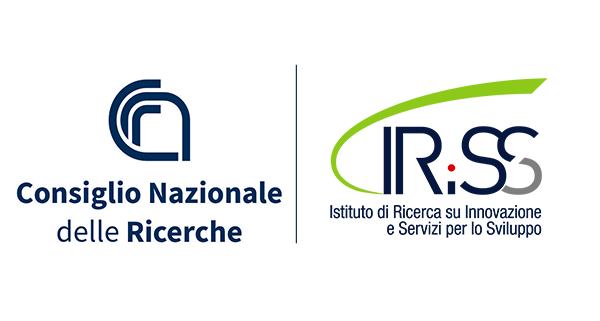
You must be logged in to post a comment.